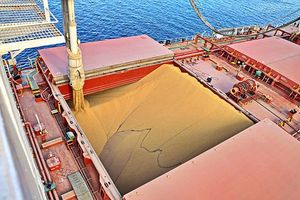Proposal to Charge Chinese Ships Fees Creates Trade Concerns
 The Trump administration is floating a proposal to charge $1 million or more in port fees on Chinese ship companies or Chinese-built vessels. The move has agricultural groups alarmed. The fees are part of an effort to rebuild the U.S. shipbuilding industry. However, there are only 14 U.S.-flagged bulk ships for moving corn, soybeans or other commodities and it would take years to add to the fleet.
The Trump administration is floating a proposal to charge $1 million or more in port fees on Chinese ship companies or Chinese-built vessels. The move has agricultural groups alarmed. The fees are part of an effort to rebuild the U.S. shipbuilding industry. However, there are only 14 U.S.-flagged bulk ships for moving corn, soybeans or other commodities and it would take years to add to the fleet.
The National Corn Growers Association (NCGA) called for the exemption of bulk farm commodities from the fees. NCGA President Kenneth Hartman said farmers are already facing rising input costs and volatility in input prices. Adding financial strain through higher transportation costs will result in more instability.
A $ 1 million increase in fees would add 40 to 50 cents a bushel in costs for a Panamax-sized ship and $1.20 per bushel for smaller, laker vessels.
The American Soybean Association said more than 50% of domestic soybean production is exported. The industry is reliant upon ocean-going vehicles to export crops around the world. There is concern that the proposal will shut off soybean exports.
The National Council for Farmer Cooperatives (NCFC) supports the U.S. building more ships. However, it points out that fees on Chinese ships would harm agricultural exports. NCFC President and CEO Chuck Conner said hefty fees on Chinese ships would increase transportation costs and diminish the competitiveness of American agricultural products.
The Agricultural Transportation Coalition indicated more than 20% of U.S. farm income comes from exports. Brazil has already gained a significant market share in soybeans, cotton, beef, and lumber.
The North American Export Grain Association (NAEGA) shared that 48% of current bulk vessels for agricultural exports are Chinese-built.
Read more about the proposal to charge Chinese ships fees here.
